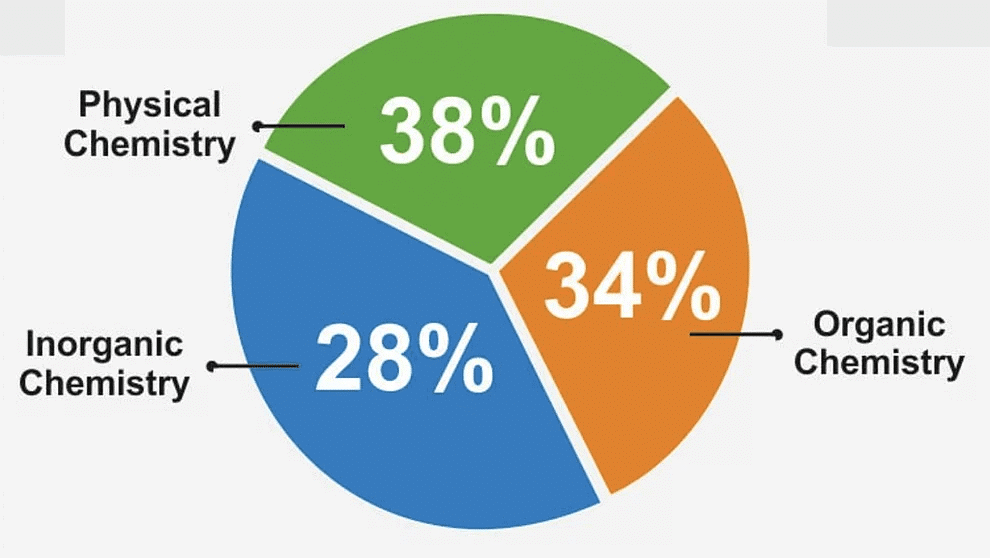How to Prepare Chemistry for JEE? | Mock Tests for JEE Main and Advanced 2026 PDF Download
Chemistry plays a crucial role in JEE Main Preparation, holding a significant weightage of one-third of the question paper. It stands on par with Physics and Mathematics in terms of importance.
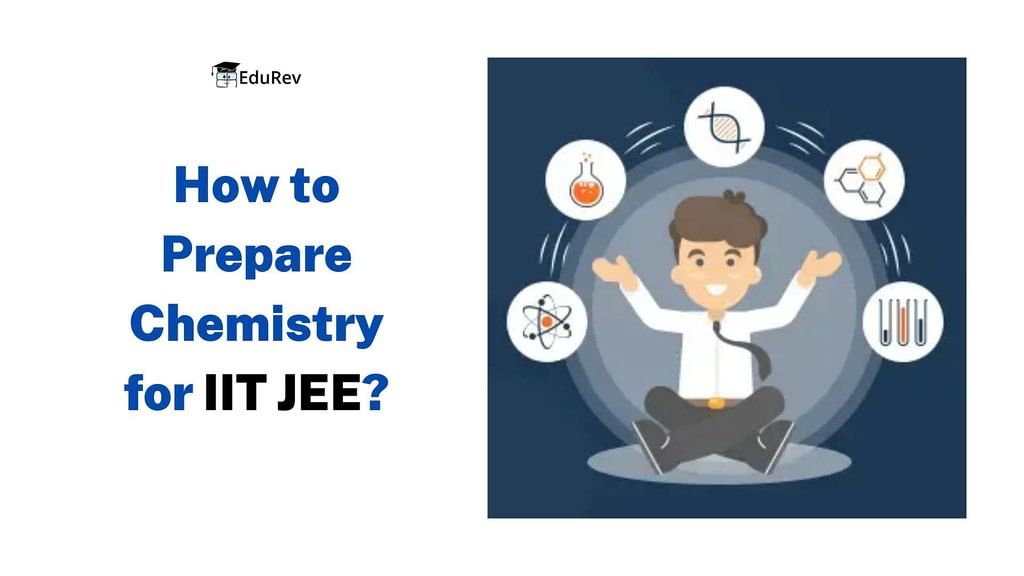
- To succeed in the JEE Main exam, students should create effective strategies that match their individual needs.
- Chemistry is often seen as a subject that is easier for students, but it should not be ignored or taken lightly.
- Many students make the mistake of not giving enough attention to Chemistry, thinking it is simpler than other subjects.
- This misunderstanding can lead to poor performance.
- It is important to dedicate the same amount of focus to Chemistry as one does to other subjects to achieve higher scores.
Excel in Your Chemistry JEE Preparation With These Tips
The Chemistry section of the exam is divided into three parts: Physical Chemistry, Organic Chemistry, and Inorganic Chemistry. It is essential for aspirants to thoroughly understand and master the concepts in these areas in order to achieve a higher score.
Below are some valuable tips to enhance your Chemistry preparation for the JEE Main:
1. Clear your Basics through NCERT Textbooks
- Understand the fundamentals through NCERT: One of the primary steps to excel in the Chemistry section of the JEE Main is to have a clear understanding of the fundamentals. A highly effective approach is to utilize the NCERT textbooks from Class 11th and 12th.
- Cover NCERT Flowcharts, diagrams and examples: NCERT books provide comprehensive insights into specific topics and chapters, accompanied by explanatory examples, flowcharts, and diagrams. After completing each chapter, test your knowledge by solving related multiple-choice questions (MCQs).
Do not overlook the highlighted section and exercises: Ensure that you do not overlook the highlighted sections and exercises provided at the end of each chapter, as they contain key points for understanding.
Also Check:
2. Avoid Feeling Overwhelmed by the Abundance of Study Materials
- Limit your Study Material: Many aspirants feel overwhelmed by using numerous books, leading to confusion and missing out on important topics. Select a limited number of recommended books to avoid information overload.
Recommended Books for Preparation
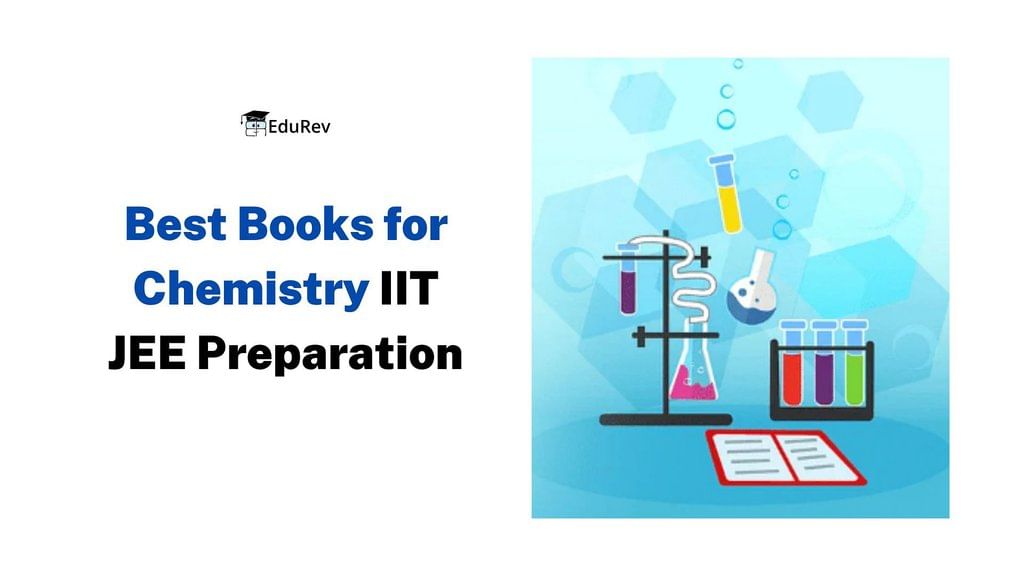
A. Physical Chemistry:
- N Awasthi's Physical Chemistry
B. Organic Chemistry:
- O P Tandon's Organic Chemistry
- Paula Bruice Yurkanis' Organic Chemistry
- M.S. Chauhan's Organic Chemistry
C. Inorganic Chemistry:
- J.D Lee's Inorganic Chemistry
3. Understand New Exam Pattern & Marking Scheme
To excel in the IIT JEE Chemistry exam, it is crucial to familiarize yourself with the new pattern and make appropriate preparations.
IIT JEE Chemistry Exam Details
- Chemistry section of JEE Main comprises Objective-type questions divided into three subtopics: Physical Chemistry, Organic Chemistry, and Inorganic Chemistry.
- As per JEE Main Marking scheme, aspirants will be given 4 marks for every right answer, while 1 mark will be deducted for each incorrect answer. 1 mark will also be deducted for incorrect Numerical-value based questions.
- Aspirants will be given a total of 3 hours duration to attempt 75 questions.
Look at the new pattern of IIT JEE Chemistry and start preparing accordingly. 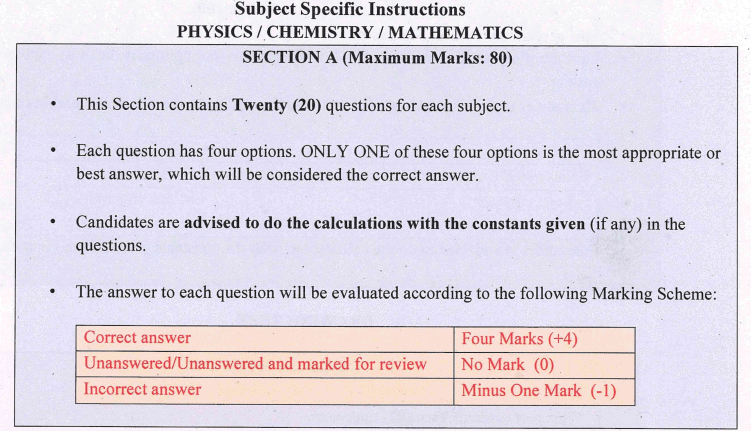
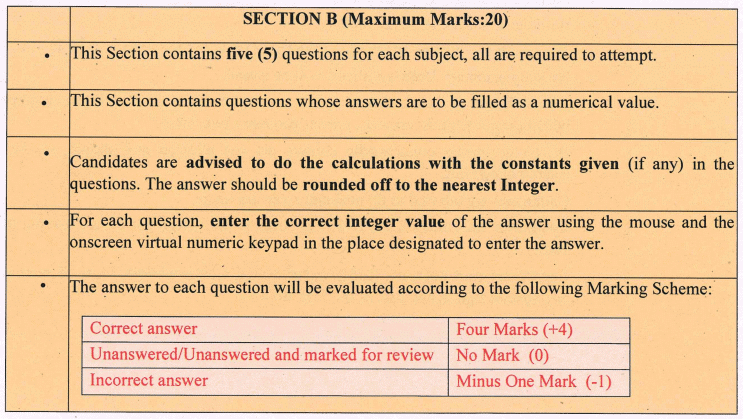
Also Check:
4. Prioritize Topics Based on Weightage
Another Chemistry JEE preparation tip is to deploy a smart study plan to focus on high-weightage topics in this section once the entire syllabus is completed. It will help candidates secure the maximum marks in the exam.Chemistry is divided into these three subjects:
- Physical Chemistry
- Inorganic Chemistry
- Organic Chemistry
Approximate Weightage of All Branches
Here are the tables of three subjects containing important topics:
1. Physical Chemistry
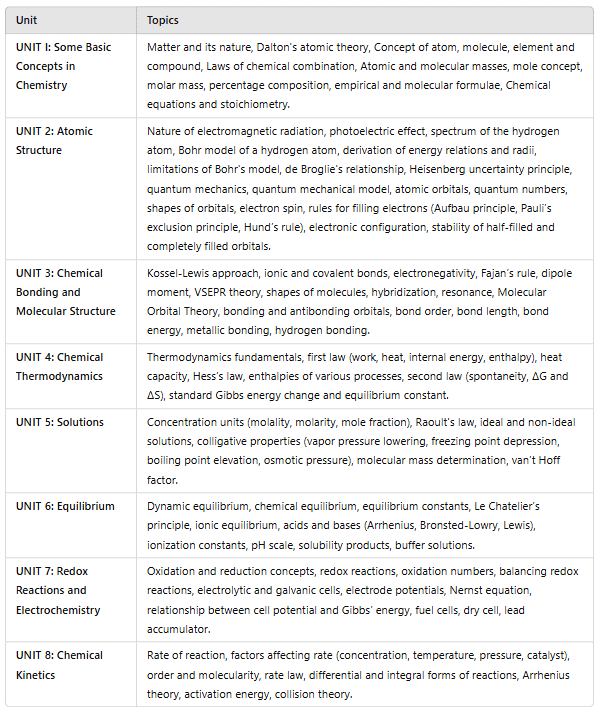
2. Inorganic Chemistry
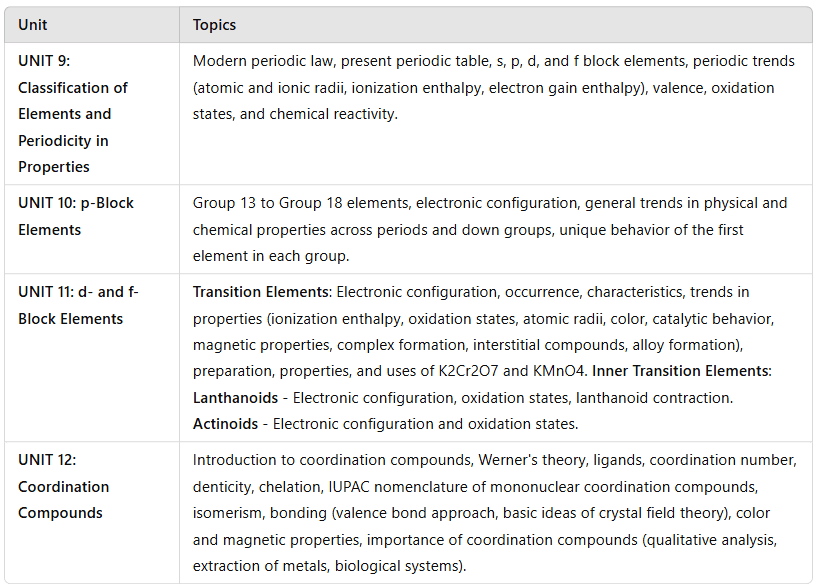
3. Organic Chemistry
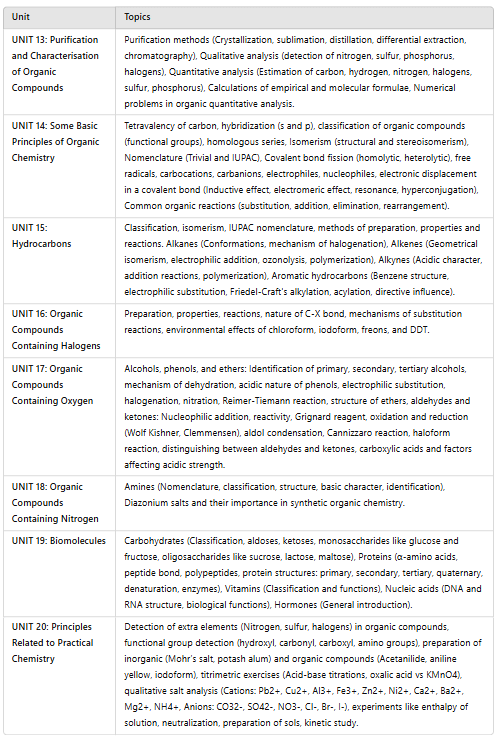
5. Solve Sample Papers, Mock Tests & Previous Year Question Papers
- Sample Papers to become familiar: Solve sample papers to become familiar with the types of questions asked in the JEE Main Chemistry exam. Understand the exam pattern, question distribution, and time constraints. Gain exposure to various question formats, such as multiple-choice and numerical-based questions asked in the exam.
- Simulate the Exam Environment with Mock Tests: Take mock tests that closely resemble the actual JEE Main Chemistry exam. Create an exam-like environment by adhering to time limits and exam conditions. Evaluate your performance, identify strengths and weaknesses, and adjust your study plan accordingly.
- Understand the Exam Trends through Previous Year Question Papers: Solve previous year question papers to understand the recurring topics and question patterns. Analyze the weightage given to different topics and prioritize your study accordingly. Learn from the question-solving techniques and strategies employed in previous years.
Also Check:
- Chemistry Mock Test Series for JEE
- JEE Main & Advanced Mock Test Series
- Chemistry 35 Year Past year Papers JEE Main & Advanced
6. Assess Your Knowledge & Manage Time Effectively
- Assess Your Knowledge and Identify Weak Areas: Analyze your performance while solving sample papers, mock tests, and previous year question papers. Identify topics or concepts where you face difficulties or make frequent mistakes. Recognize areas that require further study and improvement.
- Develop Time Management Skills: Practice solving papers within the given time limit to enhance your speed and efficiency. Learn to allocate time strategically for different sections or question types. Focus on managing time effectively to complete the entire paper without rushing or leaving questions unanswered.
- Keep a check on Speed and Accuracy: Speed and accuracy are the major determinants of your JEE Main rank. Accuracy is important as you would not like to get negative marks for doing silly mistakes. When practising with tests and previous year papers, check whether you are able to solve the problems and answer all the questions within a limited time. Improving the strike rate of your answers is also vital to score well in chemistry. You can cut down on mistakes by clearing your concepts and also by practising problem exercises.
7. Memorize All Important Formulas & Revise Continuously
- Learn Formulas Thoroughly: Candidates must frequently memorise all the vital equations, reaction mechanisms, and formulas of Chemical Bonding, Kinetics, and Radioactivity. To remember better, write the formulas on sticky notes and keep them handy so you can look at them anytime. In addition, you can maintain a separate notebook for the formulas and keep revising them.
- Continuous Revision is a Must: Continuous & frequent revision helps candidates retain concepts, equations, and formulas for a long. It is recommended to revise all the topics/chapters in Chemistry at least twice a week.
- At the time of Revision: At the time of revision, it is necessary to divide your revision time efficiently among the three branches of Chemistry – Physical Chemistry, Organic Chemistry, and Inorganic Chemistry. Whereas Physical Chemistry doesn’t require much of memorization and contains more numerical type questions, and you get comfortable with Organic Chemistry with practice, you may need to spend most of your revision time on Inorganic Chemistry to learn all the reactions efficiently.
Also Check:
8. Section-wise Preparation Guide for JEE Main Chemistry
By following the section-wise approach provided below and dedicating ample time to each topic, you can enhance your preparation for the JEE Main Chemistry exam. Remember to study the entire syllabus, allocate time wisely, and thoroughly understand the concepts to score well in the exam.
1. JEE Main Physical Chemistry Preparation Guide
We know that Physical chemistry deals with observing and understanding the physical and chemical properties of matter and our surroundings. It covers several basic, much-used concepts and covers at least 30-40% of the JEE exam paper and so, forms a big part.
Here's a table with Chapter Wise Weightage for Physical Chemistry,
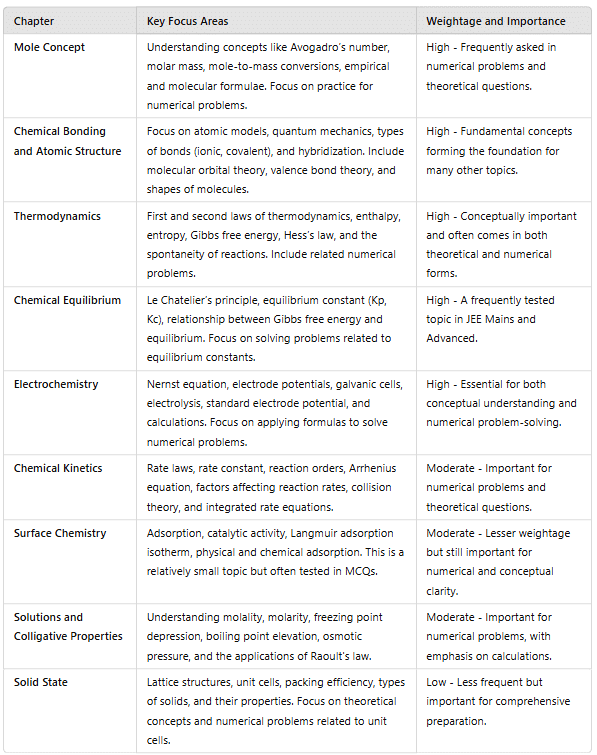
Tips for Effective Study:
- Detailed Notes: Focus on making detailed notes for each topic, especially for critical concepts like the Mole Concept, Thermodynamics, Chemical Equilibrium, and Electrochemistry.
- Practice Regularly: Physical Chemistry problems, especially numericals, require consistent practice. Keep solving a variety of problems to strengthen your grasp of different concepts and formulae.
- Titration and Stoichiometry: These topics are very common in questions. Practicing calculations and learning the exact application of formulas will help in scoring well.
- Understand Formulas: While practicing, focus on the principles, formulae, and their derivations. Understanding where and how to apply them in problems is key to solving them correctly.
This table is designed to help you focus on the most important chapters and understand where to dedicate your time and effort based on the weightage and frequency of the topics.
2. JEE Main Organic Chemistry Preparation Guide
Organic chemistry comes across as a difficult part at first, since its not an easy task to remember the reactions, compounds, mechanisms and structures. But it’s essential to master this portion of JEE chemistry as it is highly scoring and if studied well, chances of negative marking are considerably less as the questions are generally not so twisted compared to other sections.
Here's a table with Chapter Wise Weightage for Organic Chemistry,
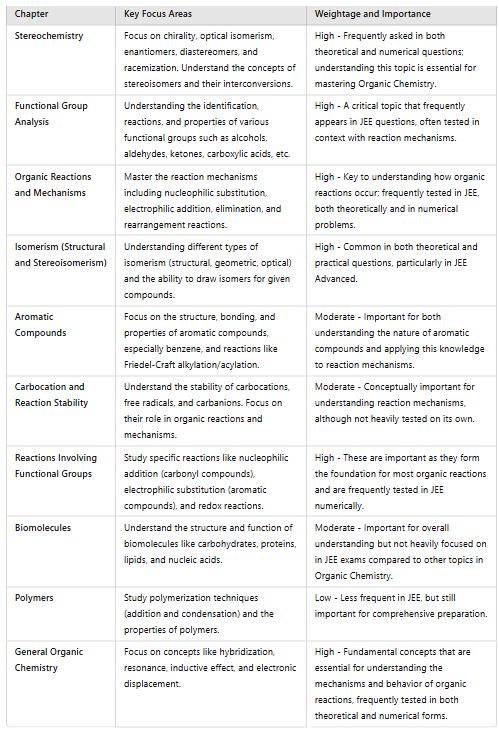
Tips for Effective Study:
Understand the Basics: Organic Chemistry is all about understanding concepts rather than memorizing facts. Focus on grasping the fundamental principles behind reactions, mechanisms, and structures.
Use Concept Maps: Draw concept maps for each topic (like reaction mechanisms, functional groups, etc.). This will help visualize how concepts are connected and make them easier to recall during exams.
Practice Regularly: Regular practice is key to mastering Organic Chemistry. Solve problems from previous years' papers, practice reaction mechanisms, and work on problems related to functional groups and isomerism.
Make Detailed Notes: Write down key points for each topic—reaction mechanisms, conditions, products, and exceptions. Keep a separate notebook for organic reactions and their mechanisms for quick revision.
Understand Reactions Mechanisms: Don't just memorize reactions; understand how they occur. Focus on learning the step-by-step mechanisms behind nucleophilic substitution, electrophilic addition, etc.
Focus on Important Reactions: Some reactions are more likely to appear in JEE. Prioritize learning commonly tested reactions like nucleophilic substitution, electrophilic addition, Friedel-Crafts reactions, etc.
Revise and Recap: Revision is crucial in Organic Chemistry. Regularly revisit and recap topics you've already studied to reinforce your memory and ensure retention.
Link Concepts Across Chapters: Many concepts in Organic Chemistry overlap. For instance, stereochemistry plays a role in understanding many reactions. Keep connecting ideas from different chapters to enhance your understanding.
Practice Molecular Structures and Isomerism: Practice drawing molecular structures and identifying isomers. This will help in solving problems related to isomerism and understanding how molecular structures influence reactivity.
Stay Consistent: Organic Chemistry can be vast, so break down your study sessions into manageable chunks. Focus on one topic at a time, and be consistent with your study schedule to avoid feeling overwhelmed.
Don’t Skip Mechanisms: Organic reactions are often tested based on their mechanisms. Understanding these will help you solve related questions more effectively and with confidence.
3. JEE Main Inorganic Chemistry Preparation Guide
Chemical bonding holds significant importance in inorganic chemistry. Prioritize topics such as p block, coordination compounds, s-block, hydrogen, and d and f block elements. However, it is essential to allocate time to study and understand all the topics mentioned in the JEE Main syllabus.
Here's a table with Chapter Wise Weightage for Inorganic Chemistry,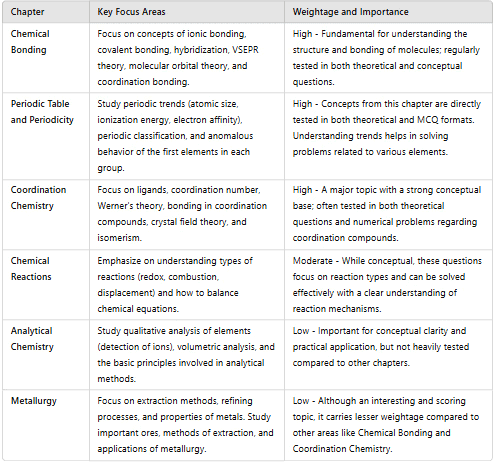
Study Tips for Effective Inorganic Chemistry Preparation
Conceptual Understanding: Inorganic Chemistry mainly focuses on concepts rather than calculations or formulas. Pay attention to the underlying principles and mechanisms behind each topic.
Don’t Overthink Questions: If you encounter a difficult question, don’t spend excessive time on it. Inorganic Chemistry questions are often based on concepts and can be solved quickly once you understand the topic. Move on if needed.
Focus on Key Topics: Prioritize important chapters such as Chemical Bonding, Coordination Chemistry, Periodic Table and Periodicity. These are frequently tested and form the core of Inorganic Chemistry.
Use Diagrams and Models: For topics like Chemical Bonding and Coordination Chemistry, drawing structures and visualizing bonding is extremely helpful for understanding complex concepts and isometric relationships.
Practice Conceptual Problems: While this section does not involve heavy calculations, understanding the concepts and practicing related MCQs or short-answer questions will solidify your understanding.
Revise Regularly: Inorganic Chemistry requires consistent revision. Revisit topics like the Periodic Table, Chemical Bonding, and Coordination Chemistry to reinforce your knowledge and help retain information.
Use the Periodic Table: The periodic table is your best friend in Inorganic Chemistry. Memorize key trends and use them to your advantage in understanding the properties of elements.
Similarly, here are the preparation tips and tricks for Physics and Maths for JEE:
|
357 docs|100 tests
|
FAQs on How to Prepare Chemistry for JEE? - Mock Tests for JEE Main and Advanced 2026
| 1. How should I organize my study materials for JEE Chemistry preparation? |  |
| 2. What is the new exam pattern for JEE Chemistry? |  |
| 3. How can solving sample papers help in JEE Chemistry preparation? |  |
| 4. What are the key formulas I need to memorize for JEE Chemistry? |  |
| 5. How can I effectively manage my time while preparing for JEE Chemistry? |  |


